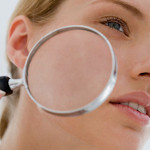For the most part, I write about skin and how to take care of it. Investing time in a skincare routine, along with adopting healthy lifestyle choices, leads to skin health, enhanced appearance, protection from skin cancer, and prevention from premature aging.
However, have you ever stopped and wondered what your skin does for you?
Confession: Before esthetic school, skin to me was just…well…skin. I knew it encased our organs, protecting them from falling out and responded to sensation but my knowledge about the subject was limited. So what did I learn?
Skin, also known as the integumentary system, is the largest organ in the body and has six primary functions: sensation, protection, heat regulation, excretion, absorption and secretion.
Sensation: Our skin contains sensory nerve endings that respond to touch, pain, colds, heat and pressure. These nerve endings detect stimuli, sending messages to the brain to react as a protective defense mechanism or to react in a positive manner.
Protection: Skin is a thin but strong protective barrier to outside elements and microorganisms. Sebum (oil), lipids (fat), sweat and water make up what is known as the acid mantle. The acid mantle has a pH of about 5.5 and this acidic level protects us from pathogens, irritation, and from the skin drying out.
The most fascinating aspect of skin is its ability to repair itself when injured, protecting the body from infection and damage from injury.
Heat Regulation: The body’s internal thermostat is 98.6 degrees Fahrenheit. Sweat glands release heat from the body through perspiration to keep us from overheating. Through evaporation on the skin’s surface, the body is able to cool itself. To protect ourselves from the cold, our blood vessels constrict and decrease the blood flow. The body’s fat layers help to keep the body warm.
Excretion: Sweat glands excrete perspiration and help detoxify the body by ridding it of excess water, salt and unwanted chemicals.
Secretion: Sebum (oil) protects the surface of the skin and lubricates both skin and hair. It’s responsible for keeping skin soft, protecting from outside elements, slowing down the skin’s evaporation of water, and maintaining water levels in the cells.
Absorption: Absorption of water, oxygen, and ingredients are essential for skin health. Select topical products help keep skin moisturized, nourished and protected.
So there you have it. A tiny, simplified glimpse of what your skin does, regardless if you take care of it or not.
Showing it some consideration and TLC a few minutes a day does not seem that like that much work after all, does it?
Happy Thursday!

Reblogged this on Stephie Estie and commented:
Brush up on your knowledge on what your skin does for you in this post!
So interesting! Thanks for sharing! 🙂
So glad you enjoyed it! 🙂